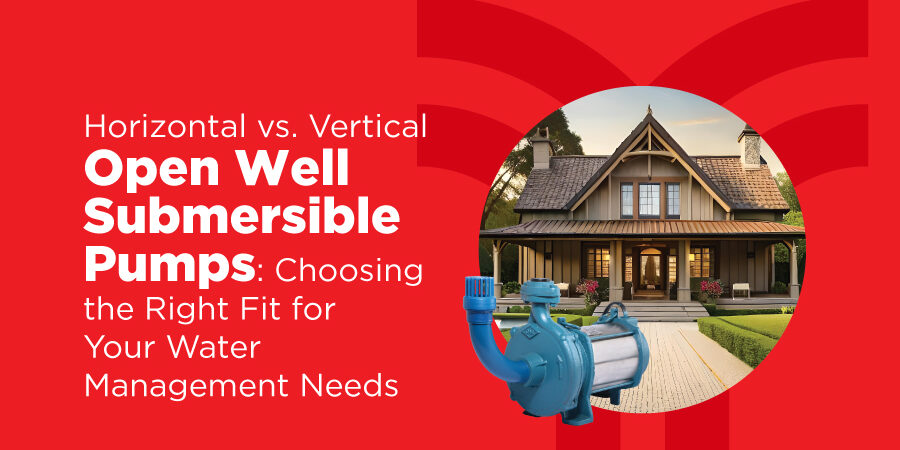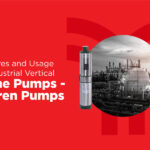Horizontal vs. Vertical Open Well Submersible Pumps : Choosing the Right Fit for Your Water Management Needs
When it comes to water management systems, choosing the right pump is important. The decision between horizontal and vertical open well submersible pumps can have a big impact on performance, maintenance, and efficiency whether they are used for home, commercial, or agricultural purposes. It’s essential to comprehend the advantages and distinctions of each kind in order to make wise choices. We explore the differences between horizontal and vertical open well submersible pumps in this extensive article to assist you in choosing the best option for your unique water management needs.
Understanding Horizontal Open Well Submersible Pumps
These pumps are intended to function underwater, extracting water from a reservoir or well. Their horizontal orientation, with the pump unit and motor arranged in a straight line, is what distinguishes them. Applications include irrigation, water delivery systems, and agriculture make extensive use of these pumps.
Advantages of Horizontal Open Well Submersible Pumps
Horizontal Open Well Submersible Pump Benefits:
- Space Efficiency : Because horizontal pumps take up less room, they are a good choice for installations with restricted space, like narrow pits or shallow wells.
- Simple Maintenance: Because of its easily accessible design, horizontal pumps make maintenance chores like component replacement, repair, and inspection very simple.
- Versatility : Horizontal pumps are adaptable to a variety of applications since they can withstand a broad range of water flow rates and pressures.
- Stability : These pumps’ horizontal position ensures stability while in use, lowering the possibility of vibrations and guaranteeing smooth operation.
Applications of Horizontal Open Well Submersible Pumps
- Agriculture : To supply water to fields and crops, horizontal pumps are frequently employed in irrigation systems for agricultural purposes.
- Municipal Water Supply: To remove water from wells or reservoirs, these pumps are used in municipal water supply systems.
- Industrial Applications : Horizontal pumps are used for dewatering and fluid transfer operations in the mining, construction, and industrial sectors.
Vertical Open Well Submersible Pumps
As the name implies, these pumps have a vertical orientation, with the motor situated above the pump unit. The purpose of these pumps is to extract water vertically from open wells or reservoirs while submerged.
- Deep Well Capability: Vertical pumps can effectively move water from considerable depths, making them ideal for deep well applications.
- Space Optimization: Vertical pumps take up less horizontal space than horizontal pumps, which makes them perfect for installations with lots of vertical space but little horizontal area.
- Decreased Priming Needs: Because vertical pumps are immersed in water, they don’t require priming, which makes installation easier and setup time shorter.
- Enhanced Cooling: The pump’s vertical design facilitates natural convection cooling, which can extend its lifespan and increase its efficiency.
Applications of Vertical Open Well Submersible Pumps
- Deep Well Pumping: Water is frequently extracted for domestic, commercial, and agricultural uses from deep wells or boreholes using vertical pumps.
- Water delivery Systems: In municipal water delivery systems, especially in places with deep water sources, vertical pumps are essential.
- Groundwater Management: In order to dewater and extract water from aquifers, these pumps are used in groundwater management projects.
Choosing the Right Pump for Your Needs
To guarantee optimum performance and efficiency, the following criteria should be taken into account when choosing between horizontal and vertical open-well submersible pumps:
Well Depth: Because a horizontal pump takes up less room and is simpler to install, it can be a better option if you have a shallow well or reservoir. To effectively lift water from considerable depths, a vertical pump would be a superior option for deeper wells or boreholes.
Space Restrictions: Determine how much room is available for installing the pump. Horizontal pumps are more suited for installations with plenty of horizontal space; however, vertical pumps can be the better choice if there is limited horizontal space.
Flow Rate and Pressure Requirements: Consider your unique demands for managing water, including the necessary flow rate and pressure. Different flow rates can be accommodated by both horizontal and vertical pumps; just make sure the pump you choose satisfies your desired parameters.
Maintenance Considerations: Evaluate component accessibility and ease of maintenance. While vertical pumps could need specific equipment for repair, horizontal pumps usually provide easier access for maintenance operations.
Longevity and Efficiency: Seek out pumps made by respectable companies with a solid reputation for dependability and effectiveness. To guarantee long-term dependability, take into account elements including motor performance, pump materials, and warranty coverage.
Both horizontal and vertical open well submersible pumps have unique benefits and are appropriate for various uses in water management. You may select the best pump from the best pump manufacturers in coimbatore for your purposes by being aware of the variations. Making the right choice in a pump is crucial for effective water management and dependable operation, regardless of whether you choose a vertical pump with deep-well capabilities or a horizontal pump that saves space. To guarantee the best performance and durability of your water management system, make an informed choice.


